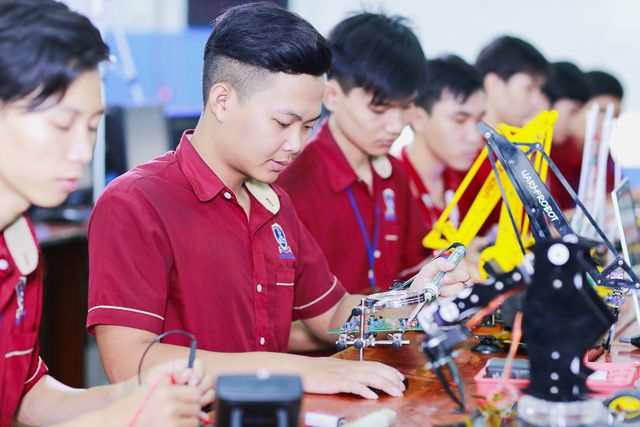Doãn Giang Dec 16 2019 9:30AM GMT + 7

For enterprises, Mr. Quan analyzed: “Enterprises need human resources, then the development and training of human resources are their responsibilities and interests. Only when businesses actively cooperate with vocational schools to prepare their own manpower, then enterprises will be satisfied. If businesses just stand outside to recruit, there will be many difficulties, not even recruiting. Only when schools and businesses have the motivation and pressure to shake hands effectively can not cooperate on paper and formalities. Cooperation must be associated with benefits. Without benefit, we have no substantive cooperation. ” Providing additional data, Mr. Quan said that in Vietnam, there are 55 million employees, of which, 24% are trained, 35% work in agriculture, and a large number have to retrain. Therefore, businesses and vocational schools must cooperate in training very well, actually, not for certification
Acknowledging from enterprises, Ms. Vi Thi Hong Minh - Deputy Director of the Bureau’s for Employer’s activities, Vietnam Chamber of Commerce and Industry (VCCI) - said that there are some regulations restricting the participation of enterprises. into Vocational Education (Vocational Education) activities. For example, the instructor at a company with a pedagogical certificate will make it difficult for businesses to participate in this activity. Few businesses take advantage of tax incentives. Therefore, it is recommended to amend and replace these regulations in the near future. Specifically, VCCI representative proposed that it is necessary to continue revising relevant laws, creating a clear legal corridor, encouraging enterprises to participate in vocational education.
Towards a closed, dual training model
Mr. Nguyen Xuan Lanh (Esuhai Company) said that his business is currently linking training and recruiting graduate students to work in Japan with 22 universities, colleges and universities nationwide. The main business lines of the company are supporting industries (engineering, manufacturing ...), high technology applications (food processing, agriculture ...), services (restaurants, hotels) ... This At the same time, they are also groups of industries with great demands and potential for development in Vietnam in the future. In addition to difficulties in language and cultural integration in the country, Vietnamese workers to Japan also face the biggest limitation is the lack of skills to work in the Japanese environment such as 5S, Horenso, Kaizen, teamwork, and management skills ... Therefore, Mr. Lanh proposed a number of recommendations to improve the effectiveness of training links between schools and businesses, whereby businesses coordinate with universities and colleges. , TC built a self-contained training model from entrance admissions, professional training, foreign language training, equipped with working style skills to meet recruitment requirements and sending graduates after work. overseas to create jobs for workers when returning home or support startups to develop their careers in Vietnam.
Agreeing with this view, Mr. Le Dinh Kha - Principal of Cao Thang Technical College (Ho Chi Minh City), said that: Not only focusing on equipping knowledge, skills, attitudes and creativity for students, schools careers need to focus on job-oriented education for students. In order for businesses to work closely with vocational schools, it is necessary to take the initiative of the school in proactively connecting with businesses, listening to the personnel requirements of businesses. The experience of Cao Thang Technical College is that building a website to help businesses posting jobs will be an effective channel to promote the school, create job opportunities for students and businesses to find suitable candidates; actively contact to take students for sightseeing, learning new technologies at businesses.
Ms. Vi Thi Hong Minh said that it is necessary to renew the training method attached to enterprises. Specifically, researching and applying the "double training" model in close coordination between training at schools and training at enterprises; regularly invite experts from enterprises to the school to share careers; combine formal teaching with extracurricular activities.
Proposing more, Mr. Nguyen Xuan Lanh said that it is necessary to have an unsecured loan policy for graduates of vocational training institutions to work abroad. The State expands 100% of the cost of working loans in some countries to graduates of vocational schools, colleges, colleges and universities when participating in the program, considering the method of cooperation between the school. - Businesses - banks to support appropriate lending procedures to help students get access to capital easily when they graduate.